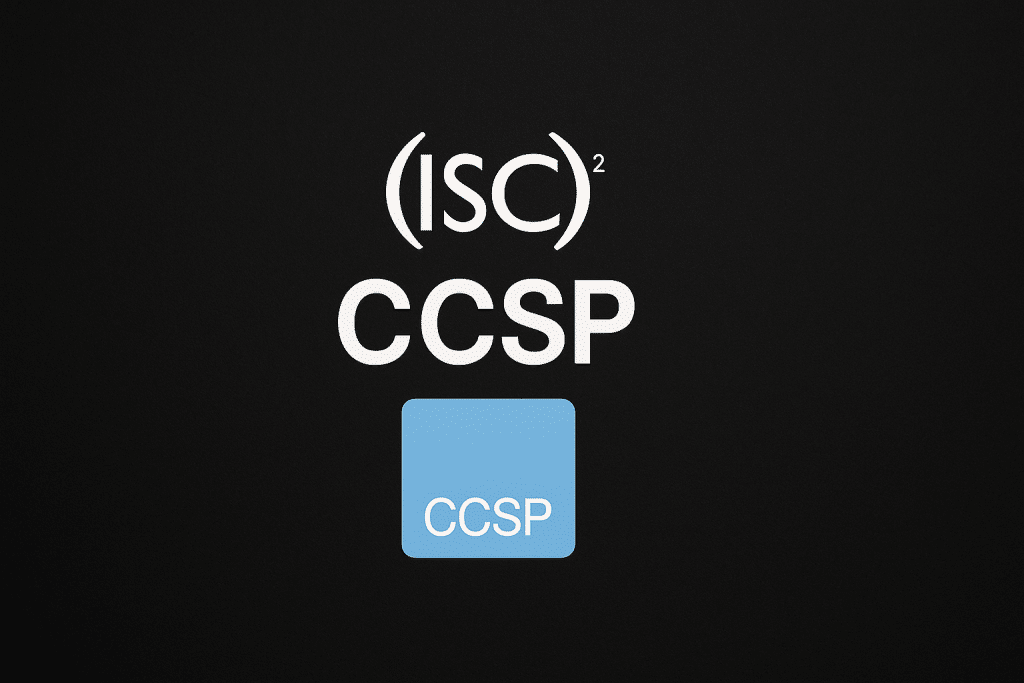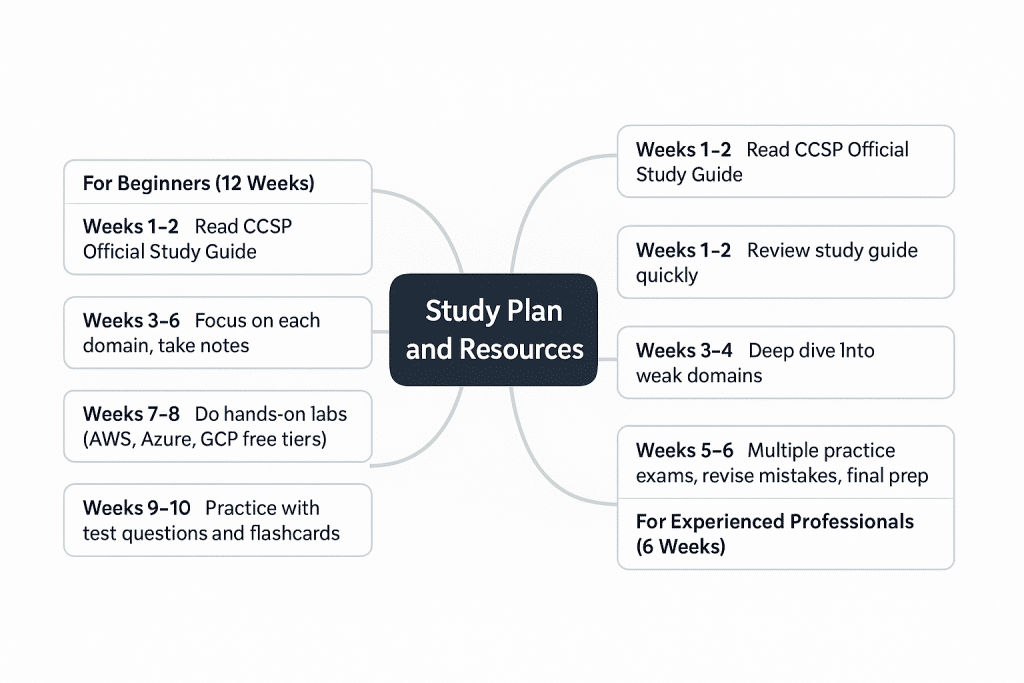
What is the ISC2 CCSP Exam?
The Certified Cloud Security Professional (CCSP) is a globally recognized certification from ISC2. It validates advanced knowledge and skills in cloud security architecture, design, operations, and compliance. The ISC2 CCSP exam is vendor-neutral, meaning it covers security best practices across multiple cloud platforms, making it one of the most respected cloud security certifications worldwide.
Who should take the ISC2 CCSP Exam?
The Certified Cloud Security Professional (CCSP is designed for professionals working in cloud security, IT security, and cloud architecture. Typical candidates include:
- Cloud Security Engineers
- Security Architects
- Enterprise Architects
- Systems Engineers
- Security Administrators
- Governance, Risk, and Compliance Professionals
Most candidates have several years of IT and security experience and are involved in designing, managing, or securing cloud environments.
Prerequisites and recommendations
Official prerequisites (from ISC2):
- At least 5 years cumulative, paid work experience in IT.
- Out of these, 3 years must be in information security.
- At least 1 year in one of the six CCSP domains.
- Candidates who lack full experience can still take the exam and become an Associate of ISC2, gaining full certification once experience is earned.
Practical recommendations:
- Hands-on experience with security compliance frameworks like ISO, NIST, GDPR, PCI-DSS.
- Having CISSP or strong cloud certifications (AWS, Azure, Google Cloud) helps a lot.
- 5+ years of combined experience in IT and security roles.
- Solid understanding of cloud services (IaaS, PaaS, SaaS).
Exam objectives and domains of the ISC2 CCSP
The CCSP exam is structured around 6 domains (based on the ISC2 Common Body of Knowledge – CBK):
- Cloud Concepts, Architecture, and Design
- Cloud Data Security
- Cloud Platform and Infrastructure Security
- Cloud Application Security
- Cloud Security Operations
- Legal, Risk, and Compliance
Objective details by domain
1. Cloud Concepts, Architecture, and Design
- Cloud computing concepts (IaaS, PaaS, SaaS).
- Cloud reference architecture.
- Security concepts relevant to cloud.
- Design principles for secure cloud environments.
2. Cloud Data Security
- Data classification and lifecycle.
- Data discovery and protection.
- Cloud storage architecture.
- Encryption and key management.
- Data retention, deletion, and archiving.
3. Cloud Platform and Infrastructure Security
- Securing cloud infrastructure components.
- Virtualization and containers.
- Cloud networking security.
- Physical infrastructure considerations.
- Identity and access management integration.
4. Cloud Application Security
- Secure software development lifecycle (SDLC).
- Cloud-specific application security testing.
- API security.
- DevOps and DevSecOps practices.
5. Cloud Security Operations
- Logging and monitoring.
- Incident response in the cloud.
- Change management.
- Disaster recovery and business continuity.
- Security as a Service (SECaaS).
6. Legal, Risk, and Compliance
- Cloud contracts and Service Level Agreements (SLAs).
- Legal requirements in cloud environments.
- International regulations (GDPR, HIPAA, etc.).
- Risk management and audit processes.
- Vendor and third-party risk.
What changed in this version of ISC2 CCSP
- Increased focus on DevOps/DevSecOps practices.
- More coverage of container and microservices security.
- Expanded legal and compliance considerations for global regulations.
- Slight weight adjustments across domains to emphasize data security and operations.
- Removed redundant concepts already covered in CISSP to keep CCSP more cloud-focused.
Registration and scheduling
- Register through the ISC2 website or Pearson VUE.
- Choose between test centers or online proctoring.
- Schedule anytime, with available slots worldwide.
Pricing and vouchers
Standard exam fee: $599 USD.
Regional pricing may vary (check ISC2 official site).
Discounts are available for:
- Corporate vouchers for organizations sponsoring teams.
- Students (via ISC2 Academic program).
- Military and veterans (with proof of service).
Policies you should know
- Rescheduling/cancellation must be done at least 48 hours before exam.
- No-show results in full fee forfeiture.
- Must bring valid government-issued ID.
- Retake policy: Wait 90 days after first attempt, max 4 attempts per year.
Scoring and results
Scored on a scale of 0–1000.
Passing score: 700/1000.
Partial credit is given for multi-response questions.
Results delivered immediately on-screen (provisional).
Official score report available in a few days via your ISC2 account.
Exam day and test experience
On-site testing:
- Arrive early, bring government-issued ID.
- Secure locker for personal items.
- Monitored test environment.
Online proctoring:
- Check-in via webcam and room scan.
- No breaks unless specified.
- Must follow strict proctoring rules.
Tips:
- Carefully read multi-choice questions (some have multiple correct answers).
- Manage time: ~1 minute per question.
- Mark tough questions and return later.
Study plan and resources

For Beginners (12 weeks plan):
- Weeks 1–2: Read CCSP Official Study Guide.
- Weeks 3–6: Focus on each domain, take notes.
- Weeks 7–8: Do hands-on labs (AWS, Azure, GCP free tiers).
- Weeks 9–10: Practice with test questions and flashcards.
- Weeks 11–12: Full-length practice exams, focus on weak areas.
For Experienced Professionals (6 weeks plan):
- Weeks 1–2: Review study guide quickly.
- Weeks 3–4: Deep dive into weak domains.
- Weeks 5–6: Multiple practice exams, revise mistakes, final prep.
Recommended resources:
- Practice dumps and mock exams.
- ISC2 Official Study Guide & Practice Tests.
- Cloud provider free labs (AWS, Azure, Google Cloud).
Certification validity and renewal
- Valid for 3 years.
- Renewal requires 90 Continuing Professional Education (CPE) credits over 3 years.
- Pay the Annual Maintenance Fee (AMF) to ISC2.
- Can also renew by earning higher-level ISC2 certifications.
Career outcomes
Common job roles:
- Enterprise Architect
- Cloud Security Engineer
- Security Architect
- IT Risk Manager
- Security Consultant
| Job Role | Average Salary (USD/year) | Notes |
|---|---|---|
| Cloud Security Engineer | $115,000 – $135,000 | Hands-on technical role, securing cloud workloads and platforms. |
| Cloud Architect | $130,000 – $160,000 | Designs secure multi-cloud and hybrid environments. |
| Security Consultant | $110,000 – $145,000 | Advises clients on cloud security best practices and compliance. |
| Enterprise Architect | $140,000 – $170,000 | Senior-level role overseeing organization-wide cloud strategy. |
| IT Risk Manager | $120,000 – $145,000 | Focuses on risk, governance, and compliance in cloud adoption. |
| Security Administrator | $90,000 – $115,000 | Maintains day-to-day security controls and monitoring. |
| Cloud Compliance Specialist | $105,000 – $130,000 | Works with GDPR, HIPAA, PCI-DSS, and regulatory cloud compliance. |
| Information Security Manager | $125,000 – $150,000 | Leads cloud and security teams, ensures secure operations. |
Related or next-step certifications
- CISSP – broader security leadership certification.
- AWS/Azure/GCP Security Specializations – vendor-specific skills.
- CISM or CISA – governance and audit focus.
How this exam compares to similar certifications
- CCSP vs AWS Security Specialty: CCSP is vendor-neutral; AWS is vendor-specific.
- CCSP vs CISSP: CISSP covers broad security management; CCSP is laser-focused on cloud.
- CCSP vs CISM: CCSP is technical and architecture-focused; CISM is more about governance and risk.
Final Words – Prepare Smart, Pass Confidently
The ISC2 CCSP is one of the most respected cloud security certifications worldwide. Whether you’re an architect, engineer, or security leader, passing this exam proves your expertise in securing modern cloud environments. To boost your preparation, use both study guides and real exam-like practice dumps for confidence.
Download PDF Questions here: CCSP Exam PDF Dumps
Try Free Practice Tests here: Free CCSP Exam Questions
Frequently Asked Questions (FAQs)
Is CCSP harder than CISSP?
Yes, for those without cloud experience. CISSP is broader, while CCSP goes deep into cloud concepts. If you already know cloud security, CCSP feels more straightforward.
Can I take CCSP without CISSP?
Yes. CISSP is not mandatory, but many candidates hold it since the domains overlap.
How long should I study for CCSP?
Beginners usually need 10–12 weeks. Experienced professionals may need 6 weeks.
Does CCSP expire?
Yes. It’s valid for 3 years and requires 90 CPE credits plus AMF for renewal.


